- Home
- Kathy Reichs
Bones of the Lost Page 6
Bones of the Lost Read online
Page 6
“Nice.” I unbuckled my seatbelt.
“I’ll wait here.”
“I’ve got to shower.”
“No rush.”
I held out a palm.
Pete pulled his keys from the ignition, removed one, and handed it to me.
“Thanks.” I flipped the door handle.
“Tempe?”
“Yes?”
“Don’t lock it in the house.”
Pete’s phone was out before I was.
The annex has a bedroom and bath upstairs, living and dining rooms, kitchen, a study/guest room, and bath down. Garden in back, grassy patch in front, patio to one side. Though cramped, the place suits me perfectly.
I let myself into the kitchen and flipped on the light.
“Bird?”
No cat.
“Here, boy.”
Nothing but a soft ticking coming from the parlor.
I found Birdie under the sideboard holding Gran’s clock. Though cats are said to lack facial musculature capable of expression, his message was clear.
“You mad?”
Pausing a moment for effect, Birdie rose, stretched, then padded toward me, cool but prepared to consider explanation. And dinner.
I bent and scratched one furry white ear.
“Sorry, champ. But tonight’s menu is a bit subpar.”
Returning to the kitchen, I plucked two eggs from the fridge, mixed in a tin of sardines, and heated the combo. When the mess congealed I scraped it into his bowl.
One thing about Bird, he does not hold grudges. All sins forgiven, the feline dived in.
Since I often spend my days with decomp and biohazard, I’ve mastered the art of the quick cleanup. And amassed a spa-worthy array of soaps, gels, and lotions. Tonight I grabbed the nearest. Out and dry in five minutes, smelling of grapefruit.
Birdie walked in as I was pondering acceptable couture for delivering divorce papers. My eyes met his.
“Screw it.”
I grabbed jeans and a black tee, added pale green seashell earrings and a black cotton jacket.
“What do you think?”
Birdie cocked his head but rendered no opinion.
I hurried down to the study, cat at my heels. As I snatched up the documents, Birdie did a figure eight through my ankles.
I glanced at my watch. Pete had been waiting a full twenty minutes.
The cat arched his back and lifted his tail. I scratched his ears and added a series of down-the-back strokes.
When I popped the Beemer door, Pete was still on the phone.
“Don’t inhale while you’re spraying.” Pause. “Okay. But really, I’ve got to go.” Shorter pause. “Yes, I’ll call when I’m on the way. I love you, too.” Sotto voce.
“Sorry. Bird—”
“No problemo. Ale House good with you?”
“Sure.” It wasn’t. Big-screen TVs. Fans cheering, groaning, coaching. Noise level at eighty-five decibels. “Is Summer having bug issues?”
Pete looked at me blankly.
“She needs to fumigate?”
“Oh, no.” He shook his head. “She’s spray-painting antique bottles to use in the centerpieces. Or some damn thing. It’s supposed to look artsy.”
Wedding talk. Nope.
A short, thrumming blast of Bob Marley, and we were at the Carolina Ale House, a multiscreened extravaganza on the ground floor of a steel-and-glass tower in the heart of uptown. Pete managed to secure a table away from the bar. Not quiet, but out of the no-talk zone.
A waitress greeted Pete with more teeth than a radial saw and favored me with a millisecond of eye contact while mumbling that her name was April.
“Fat Tire ale?” April beamed another dental stunner at my ex.
“Good memory.” Pete did the finger-pistol thing.
I asked for Perrier and lime.
Pete chose the baby back ribs. I went for flatiron steak.
Food and drinks ordered, I pulled the documents from my purse and laid them in front of Pete. He glanced at them but did not pick them up.
A void stretched across the table, a bubble of quiet amid the din around us. So little paper. So few words for a love that had produced hopes, dreams, and a beautiful daughter. A love destroyed by an act of betrayal.
There should have been some ceremony. An unwedding? A rite of dissolution? Something beyond a Settlement Agreement and Verification. At least a better font.
“Sorry it’s taken so long.” I broke the awkward silence. “No excuse. I should have—”
“It’s not a problem, sugarbritches. I’ll have these filed before noon.”
“Don’t call me that.” Reflex.
“Okay.” The old Pete smile. “Cupcake.”
Pete slid the papers into the snazzy jacket pocket, then patted my hand.
The touch. His skin on mine. So familiar.
I groped for neutral conversational ground.
“Your wrongful-death case, barrister? How’s it going?”
“I won’t know until my doctor gets deposed in the morning.”
I told him about the criminal misdemeanor trial from which I’d escaped. He told me about a tooth that was causing him grief.
Mercifully, April arrived with our drinks. Pete chugged. I sipped.
“And you?” After another awkward pause. “How’re things with Monsieur Le Dick?”
Monsieur Le Dick, Pete’s flip name for Andrew Ryan, Lieutenant-détective, Section des crimes contre la personne, Sûreté du Québec. My colleague when I consult to the Laboratoire de sciences judiciares et de médecine légale in Montreal. My on-and-off lover. Off now. Off forever?
“He’s good.”
“Bon.” Pronounced “bone.”
“Never speak French, Pete.”
And don’t ask about Ryan. Don’t force me to voice my anxiety over his recent coolness. His distance.
If Ryan and I truly were finished, the split wouldn’t be as wretched as the one from Pete. There would be no bitterness, no angst. No stunned child to whom an explanation was due. No moving out. No division of property. No standing in line at the DMV to record change of address. With Ryan, there’d be nothing but a murky trench of sadness.
I couldn’t bear to talk about it. To think about it.
“I’m swamped with work here,” I said.
“Anything interesting?”
“Four mummified dogs from Peru.”
Pete cocked a questioning brow.
I told him about the confiscation by ICE at the Charlotte airport.
Our plates arrived and, for a full minute, we focused on salt and pepper, steak sauce, butter, sour cream, and ketchup. April asked if I needed more ice.
Inexplicably, my thoughts went to the child in the cooler.
“We’ve also got a teenage girl,” I said to Pete. “Run down last night near Old Pineville Road.”
“The parents must be devastated.”
“We don’t know who she is.”
“Jesus. Larabee’s case?”
I nodded. “There are a couple of leads. If Slidell would get off his fat ass. In his mind—”
“Which is small.”
I smiled. “In his small mind, she’s an illegal turning tricks.”
“Proof?”
“A pink purse, needle tracks, and bad teeth.”
“That’s it?”
“Bleached hair, a dark complexion, and a Spanish note in her purse.”
“Skinny thinks she’s from south of the border.”
I nodded.
Pete chuckled and shook his head. He’d met Slidell, knew how pigheaded the man could be.
The clamor of voices hushed. Then a multi-throated groan filled the room. Some sporting event was not going well for the home team.
Pete’s ribs were stripped and stacked when he laid down his utensils and wiped his mouth.
“Can I roll something by you?”
“Sure.”
“I have a friend, Hunter Gross. I don’t think you know hi
m. His nephew, John, is a marine second lieutenant.”
“Semper fi.” I snapped a salute.
Pete had served in the Corps, still kept the Marine flag on a small stand in his office. Every November tenth, he celebrated its birthday with his old OCC buddies.
“Until a few months ago, John was serving as a platoon leader in Afghanistan. As I understand the story, he and his men were ordered to search a village.” Pete stopped, an odd expression on his face. “I’m not sure of the details, but the kid’s been accused of murdering unarmed civilians.”
“Jesus.”
“Hunter says no way he’s guilty.”
“Your friend. The uncle.”
“Yes.”
“What’s your take?”
Pete shrugged. “I’m not sure what to think. Hunter says the kid’s a good marine, had plans to make a career of it, but I don’t know him.”
“Where is he now?”
“Cooling his heels at Camp Lejeune pending completion of an inquiry.” “Relieved of duty?”
Pete nodded.
“Hard.” For something to say.
“Yeah. Hell on the family.”
Cold-blooded killer? Incompetent leader? Good soldier, bad decision in the heat of battle? Tough one.
In the same place Katy was posted.
Pete bunched and tossed his napkin. Looked at me. Read my mind.
“You’re thinking of Katy, right?”
I didn’t respond.
“Katy’s a private. She won’t be leading anyone anywhere.”
“She’s in artillery.”
“Behind the lines.”
“Launching rockets at people who hate us.”
“Not everyone in Afghanistan hates Americans.”
“I know. But life’s so … unpredictable over there. She could be killed on her way to breakfast.”
“So could I.”
“You know what I mean.”
“Katy is a survivor.”
He said it with such confidence I could almost believe him. Still. The images. Katy lying by a burning Humvee on a bleak desert road. In a body bag.
Like the girl in the cooler.
The hit-and-run victim had a mother somewhere, wondering where she was. Why she wasn’t calling. Was someone assuring her that her little girl was well?
I gulped the last of my Perrier, now mostly melted ice.
“My car—”
“Off we go!”
Pete pantomimed writing. April and her teeth reappeared with the check.
We did our usual lunge. Pete got there first, paid cash, including a tip that could have financed a presidential campaign.
Five minutes of Rihanna, and we were at the courthouse parking deck. I got out and circled to Pete’s side of the car. He lowered his window.
“So. Tomorrow we’re officially free.” Christ. Did I really say that?
“Yeppers.” Equally lame.
We shared a clumsy through-the-opening hug. Lasting a moment too long?
“All the best to you and Summer.”
“Thanks. Keep in touch?”
“Of course.”
“Do you want me to wait until you’re wheels-up?”
“I’m a big girl.”
“But lousy with keys.”
I dug out and dangled the spares from my desk. Returned his loaner.
Then Pete was gone.
My purse was still in the Mazda. The hated shoes.
Below, passing vehicles made soft whooshing sounds on Fourth Street. In the distance a drunk warbled “Lucy in the Sky.”
I dropped one set of keys into my purse and pulled out my phone.
Slidell answered after two rings.
“Yo, doc.” In the background I could hear the play-by-play of a baseball game.
“How’re you coming on the hit-and-run vic?”
“Tomorrow—”
“Have you canvased the neighborhood? There are a few shops along Old Pineville Road.”
“Like I said—”
“What about body shops?”
“I’m on it.”
“Clothing and boot shops?”
“On it.”
“Clinics?”
No response.
“Did you drop by St. Vincent de Paul?”
“On it.”
“On it when?” Slidell’s cavalier attitude was pissing me off.
“Look, we got nada. We’re going to get nada. If she’s illegal, no one’s gonna come forward. If she’s on the stroll, no one’s gonna come forward.”
Deep down I suspected Slidell was right. Still.
“How about running her picture in the paper?”
“Did you hear what I just said?”
“Can’t hurt, right?”
“Neither can tossing goat turds into the sea.” Deep sigh. “Look, I ain’t blowing you off. A few hours ago I caught an MP with ties to the mayor. Single mother, two kids, steady job at the Rite Aid. Gone. Chief says I got no life till the lady is found.”
The line went silent.
I sat, irritated but not totally discouraged. Though sometimes slow out of the gate, Slidell usually came through in the stretch. Unless preoccupied. Enter high-pressure missing-person case.
I pictured the girl with the pink barrette.
I pictured Katy the last time I’d seen her, at Fort Hood the day she graduated from basic combat training. Instead of barrettes she wore camouflage fatigues, boots, and a black beret. Her body was rock hard, her long blond hair tightly knotted at the nape of her neck.
Throughout that day, I’d fought back tears of pride. Tears of dread.
The same dread I felt sitting alone in that parking deck.
What if Katy disappeared and no one bothered to find her? To determine if she was dead or alive?
The human brain is a switching station that operates on two levels.
As my hand turned the key, my higher centers sent up images of a lonely stretch of two-lane.
Instead of going home toward Myers Park, I wound through uptown toward I-77.
Took the southbound ramp.
Headed toward Woodlawn.
THE STRETCH OF old pineville road I was driving had once been the main route from Charlotte to Pineville. But the town and the road had both seen better days. And busier. South Boulevard, to the east, now had all the action, and few motorists made this strip their final destination.
I flicked on my turn signal and tapped the brakes. Double beams bore down on my trunk. A horn blared and a large mass swerved around me, tail lights like glowing red eyes in the darkness.
After reversing direction, back toward uptown, I pulled to the shoulder and studied my surroundings. No sidewalks. No traffic signals. Deadly for pedestrians.
Off my passenger side ran a broad strip of weeds and scrub vegetation. Beyond that, the tracks of the Lynx Blue Line, the first and only spur on Charlotte’s light-rail system.
Had the girl come here by train? To what station? Woodlawn? Scaleybark? If she’d descended from a Lynx platform, might someone have seen her?
Had she come by car? On foot? Was she alone? With a companion? A kindly stranger who’d offered a lift? A burger? A drink?
And, above all, why? Why was she here? Larabee was placing her time of death at somewhere between eleven and two. What had lured a teenage girl to this isolated spot in the middle of the night? With no jacket in the chilly weather.
I knew the CSU techs had photographed and bagged every scrap of evidence. So why was I here after my long, frustrating, blister-raising day?
To see for myself. To hear. To smell. To sense the place.
Keys firmly in my pocket, I popped the door. A gust of wind caught my hair and flipped the hem of my jacket. Though summer lingered by day, come sunset the air was already turning cool.
I zipped up to my chin.
I was more warmly dressed than my Jane Doe had been. Why? An adolescent fashion statement? A rushed departure? Anticipation of an evening indoors?
I pictured the high-heeled boots and denim skirt. Meaningless. Kids dressed like that to hang out at the mall, attend school, or party with friends.
A train whistled softly in the distance. Not the light rail. A freight line on parallel tracks. Norfolk Southern? CSX? Aberdeen and Carolina Western?
Had the girl hopped from a boxcar and walked to Old Pineville Road? A long shot, but possible.
If the girl had arrived by car, it was doubtful she asked to be dropped here. Did the driver force her to disembark? Why? An argument? The conclusion of a cash transaction?
I thought about the semen stains.
Was the sex consensual? Was it followed by a disagreement, her slamming from a vehicle in anger? Was she raped, then tossed aside like last week’s trash?
Was Slidell right? Had the girl tried to turn a trick and been run over by a renegade john?
I scanned the far side of the road, saw the black silhouettes of commercial buildings. Pewter-gray space between.
I thought about the US Airways club card in the girl’s purse. About John-Henry Story. Why was she carrying a dead man’s plastic? Had she been traveling with him the last time he used it? Going where? Had he given the card to her? Had she stolen it from him? It was nothing she could have used without him present. Why had she kept it?
The girl’s body was found near the intersection of Old Pineville and Rountree, a short distance in front of me. Was she running when hit? Standing still? Walking? How far had she crawled after being struck?
A truck rumbled by, arcing wide to avoid my Mazda.
Note to self: Have Slidell check with truckers frequenting this route. Appeal to motorists driving here late last night. But he would know to do those things.
Did the girl see the vehicle that killed her? Did she try to avoid it, or was she hit before sensing danger?
I stood a moment, shivering, listening. The silence was broken only by the tic-tic of a wind-tossed wrapper. A muted car horn.
My nose took in the scent of oily cement. Exhaust. Dry leaves, the way they smell only in autumn.
I scanned up and down the pavement. On the opposite side, maybe a quarter mile behind me, I detected a faint blue-and-red twinkle I hadn’t noticed before. Sliding behind the wheel, I hung a U-ey and drove toward it.
The twinkle came from a white stucco cube that probably began life as a filling station. Christmas lights rimmed a front window in which faded announcements covered most of the glass. Red lettering on the front wall identified the establishment as the Yum-Tum Convenience Mart.

 Two Nights
Two Nights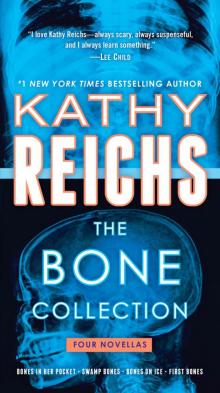 The Bone Collection: Four Novellas
The Bone Collection: Four Novellas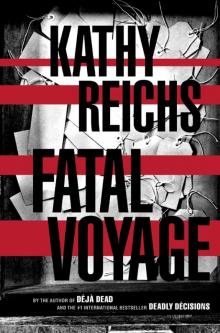 Fatal Voyage
Fatal Voyage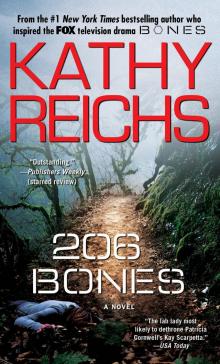 206 Bones
206 Bones Bones to Ashes
Bones to Ashes Terminal
Terminal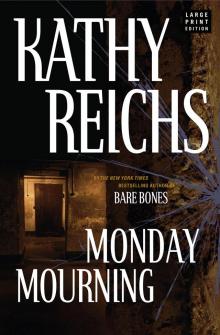 Monday Mourning
Monday Mourning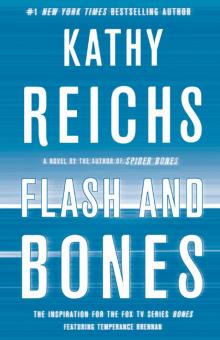 Flash and Bones
Flash and Bones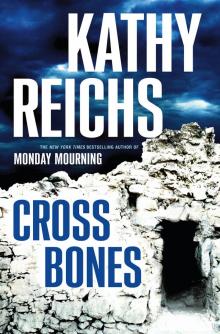 Cross Bones
Cross Bones Devil Bones
Devil Bones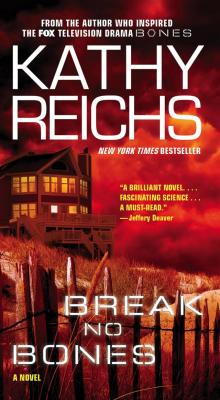 Break No Bones
Break No Bones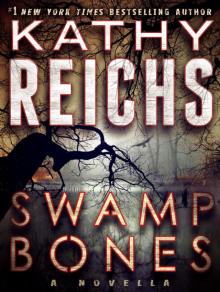 Swamp Bones
Swamp Bones Déjà Dead
Déjà Dead Shock
Shock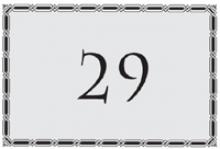 Spider Bones
Spider Bones Death Du Jour
Death Du Jour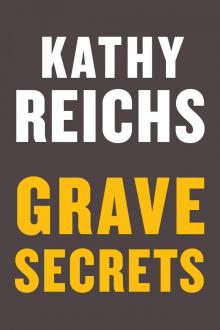 Grave Secrets
Grave Secrets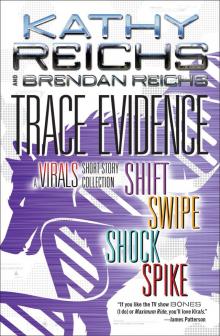 Trace Evidence: A Virals Short Story Collection
Trace Evidence: A Virals Short Story Collection Bones on Ice
Bones on Ice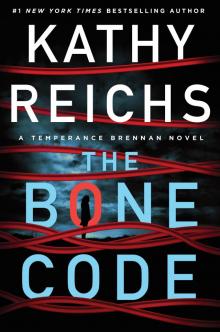 The Bone Code
The Bone Code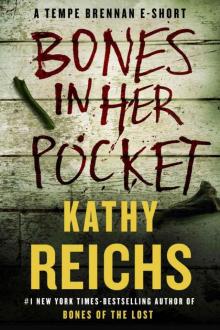 Bones in Her Pocket
Bones in Her Pocket Seizure:
Seizure: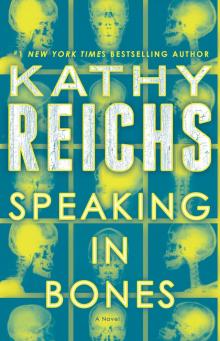 Speaking in Bones
Speaking in Bones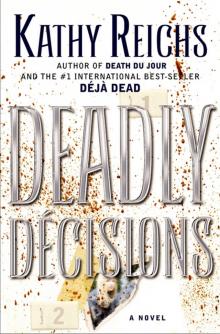 Deadly Decisions
Deadly Decisions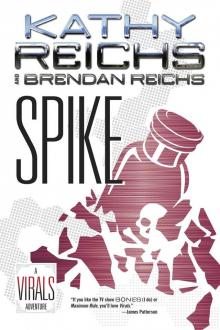 Spike
Spike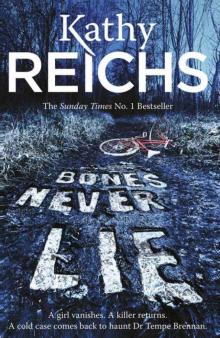 Bones Never Lie
Bones Never Lie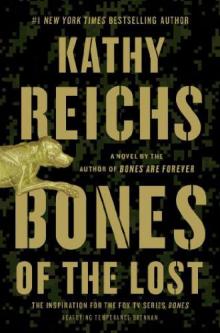 Bones of the Lost
Bones of the Lost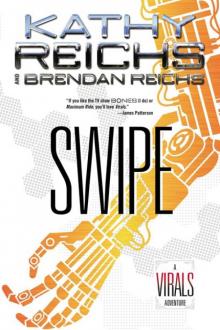 Virals 03.5 - Swipe
Virals 03.5 - Swipe Exposure
Exposure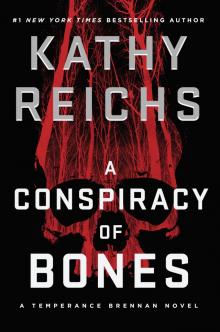 A Conspiracy of Bones
A Conspiracy of Bones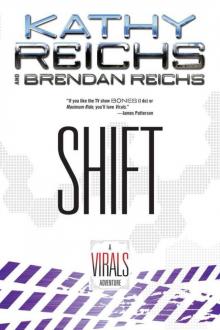 Shift (tory brennan)
Shift (tory brennan)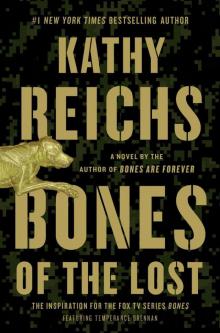 Bones of the Lost: A Temperance Brennan Novel tb-16
Bones of the Lost: A Temperance Brennan Novel tb-16 Virals tb-1
Virals tb-1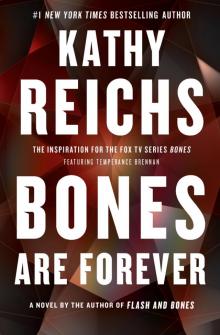 Bones Are Forever tb-15
Bones Are Forever tb-15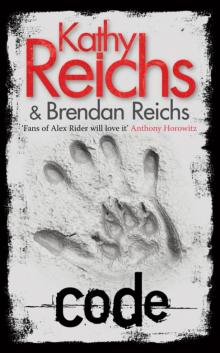 Code tb-3
Code tb-3 Seizure tb-2
Seizure tb-2 Deadly Descisions
Deadly Descisions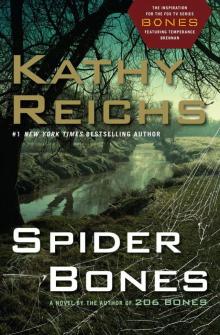 Spider Bones: A Novel
Spider Bones: A Novel